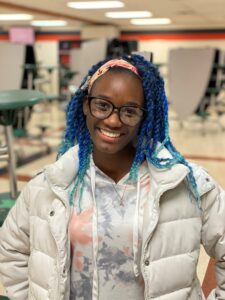
Students challenge CCS to confront racism, bullying in schools
Cooperstown High School senior Amelia Williams rose without hesitation when Board of Education President Tim Hayes opened the public comment portion of the panel’s December 16 meeting in the school’s media center.
In the few minutes of time allotted to any such speaker, Ms. Williams delivered a personal message describing her experiences on the receiving end of racist and discriminatory behavior in the school’s hallways and on her school bus.
“I’ve had racial slurs spoken right in front of me,” she said. “I hear one white student greet another in the hallway using the ‘n’ word. It is not okay for the use of the ‘n’ word on the school bus.”
“Why is racism being tolerated in this school?” she demanded, telling the Board and Superintendent of Schools Sarah Spross that she no longer rides her bus because she is “filled with anxiety and fear of a 40-minute ride to school when I don’t feel accepted or safe.”
Ms. Williams said she had reported seeing students in the school building wearing clothing bearing the image of the confederate flag — something others speaking later noted was in direct violation of the school’s policy. The school’s dress code expressly prohibits “Clothing that displays the names or advertisements of drugs, alcohol, or tobacco products, profane, vulgar, violent, illegal, immoral, or hate messages … examples of some inappropriate displays include, but are not limited to the following: sexual innuendos … hate symbols — Nazi emblems, KKK, etc.”
“Another person’s ignorance and hate is not my burden,” she said. “I want dignity for all students in this school. I am tired. Change starts at the end of our comfort zone. It’s time to get uncomfortable.”
CCS Senior Class President Grant Crowson followed with similar comments.
“There’s racism and harassment here in an environment that does not support the victims,” he said. “We hear racially-motivated hate speech and when we report it we’re told we’re being ‘too sensitive’. What’s too sensitive when you hear one kid tell another to ‘go back to your country’?”
He urged the Board to review personnel and procedure “to find out who is contributing to a culture of hate and toxicity.”
“Imagine being Amelia,” Hartwick resident Jennifer Dibble said to the Board. “We need a total reconstruction of what’s happening in this school. You can’t change what’s happening at home where kids are learning all this awful behavior but this school should be a safe space for all.”
“We can’t just keep re-reading the policy we have,” she said. “It doesn’t work. It’s that simple.”
After the meeting, Mr. Crowson expressed confidence that Board members and Superintendent Spross heard the message.
“I know Miss Spross definitely feels the need to work with us and hear what we have to say,” he said. Board policy does not allow members to respond during the meeting to comments made during the public session.
But with some three dozen residents attending the meeting in person and another 50 watching the live webcast, Mr. Crowson said he was encouraged.
“I was there speaking on behalf of most of the senior class,” he said. “The Board meeting was the right place to tell more people that we’re just done with this. There are kids in the school who feel like they don’t belong and it’s not right.”


unfortunately, being Cooperstown School, this type of behavior will not end, but merely get pushed under the rug as do all other issues that make the school look bad.
Good for CHS seniors Ms. Williams and Mr. Crowson standing up and telling the Board of Education about the problem of racism in the school. I hope the Board and CCS district administrators will hear what they said and develop a plan to address it. Ms. Williams should be able to rid the bus and attend school without fear.
What incredible courage and aplomb were shown by Amelia in standing up and addressing the Board! And kudos as well to Grant Crowson for his comments.
I suggest that all Board members (and all of us) read “White Fragility. Why It’s So Hard For White People To Talk About Racism.” by Robin D’Angelo, Beacon Press 2018.
John Davis